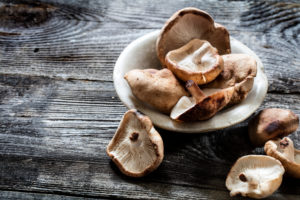Uh-oh, you’ve caught the latest office lurgy! The situation is looking bad. You’ve got a raspy, sore throat, congested sinuses, the dreaded body aches, and what is starting to feel like the mother of all headaches. Unfortunately you have hundreds of work things due at ridiculous deadlines and can’t afford any time off. An action plan is called for, code-named: ‘operation get me back to 100% – ASAP’. While there are several natural medicine troops available to call on for assistance, it’s first important to know what battle you’re actually trying to fight.
The classical symptoms of fatigue, chills, runny nose, sneezing, coughing, a sore throat, and head and body aches are mostly due to your own immune response, rather than the harmful effects of the virus itself. Over 200 viruses can cause the common cold, and the most common one, the rhinovirus,1 enters your body via the nose and mouth. Once in your system, viruses will bind to tissues in these areas and inject their genetic material into your cells. The virus is then able to take control, and instruct the host cell to make viral particles using the cell’s own materials. These are then released from the cell to invade or attack other nearby cells. What dirty scoundrels! To sound the distress signal, these infected cells release chemical messengers known as cytokines, which activate the inflammatory processes that fight the virus, but also result in your symptoms.
It’s Time to Fight Back!
When battling the lurgy, you need a team of natural medicine allies to wage war against these viral intruders, and get you feeling more like your old self again.
Leading the charge is andrographis – this potent Ayurvedic herb can help reduce the symptoms and duration of the common cold,2 and stimulate certain white blood cells’ (WBCs) to consume and immobilise pathogens.3 In fact, a recent research review found andrographis significantly improved the symptoms of acute upper respiratory tract infections or ‘URTIs’ in 33 independent clinical trials.4 That is strong evidence! Importantly, the review showed that andrographis reduced sick days in both adults and children.5
Your second recruit is zinc. A review of 13 clinical trials showed that supplementing with zinc within 24 hours of symptom onset reduced the duration and severity of colds,6 with a 30mg dose also shown to boost the production and function of immune cells (called T cells) needed to eliminate pathogens from the body.7 A longer term trial, supplementing zinc for five months, also resulted in reduced infection rates, sickness-related absenteeism from work, and the need for antibiotic prescriptions.8

The next allies to call on are medicinal mushrooms. Notable species include cordyceps, coriolus, reishi and shiitake, who collectively are able to provide symptomatic relief from the common cold, enhance immune strength and function, inhibit viral entry into host cells, stimulate the activity of various WBCs, and promote the production of antibodies (that help your body fight the infection).9,10,11,12
This cellular activation achieved via the supplementation of medicinal mushrooms results in improved immune-surveillance, or vigilance of the immune system, and resistance to infection.13
The last conscript you can call upon is the ever-reliable vitamin C. Studies have shown it can reduce the symptoms, severity and duration of the common cold by an average of 23% 14,15 and it can also enhance the motility and migration of WBCs during infection,16 getting them to where they are needed to fight invaders fast.

Are Antibiotics the Answer?
Many people race to the GP as soon as they are sick looking for antibiotics, but when it comes to viral infections, these are not best soldiers to be calling on. The American Centers for Disease Control and Prevention put it best when they advised “since the common cold is caused by viruses, antibiotics will not help it get better”.17 Antibiotics can indeed save lives, however it must be remembered that they are designed to kill bacteria, not viruses.
What Else Can You Do?
Despite all of the previously mentioned evidence on the efficacy of natural medicines, a seriously smart tactic in the war against President Virus is getting ample rest and down time when you can (e.g. cancel all unnecessary meetings, engagements, social events), and consuming plenty of fluids – notably water, warming teas, and homemade chicken and vegetable soups and broths. In order to save your family and work colleagues from contracting your virus, practice good hand hygiene by sneezing or coughing into a tissue (or at worst your elbow!), and washing your hands after blowing your nose or handling used tissues. Also, avoid close contact with others during this time – you may need to apologise for not shaking hands, and explain to little ones that you will kiss them good night when you’re feeling better.
When it comes to colds and flus, prevention is obviously better than a cure. For advice and guidance on how to support your body from getting sick in the first place, check out the Are You Sick of Being Sick? blog. However, if you’re sick right now, nothing beats expert advice on how to defeat the dreaded virus overwhelming your body’s defences. Talk to a tactical genius (also known as a Natural Healthcare Practitioner) for targeted immune support specific to your own unique circumstances. Find your nearest Practitioner here.
References
1. Antibiotic Prescribing and Use in Doctor’s Offices. Centers for Disease Control and Prevention [Internet]. Atlanta (GA): CDC; 2017 [Page last updated: September 26, 2017. cited 2018 July 18]. Available from: https://www.cdc.gov/antibiotic-use/community/for-patients/common-illnesses/colds.html
2. Poolsup N, Suthisisang C, Prathanturarug S, Asawamekin A, Chanchareon U. Andrographis paniculata in the symptomatic treatment of uncomplicated upper respiratory tract infection: systematic review of randomized controlled trials. J Clin Pharm Ther. 2004 Feb;29(1):37-45.
3. Kumar RA, Sridevi K, Kumar NV, Nanduri S, Rajagopal S. Anticancer and immunostimulatory compounds from Andrographis paniculata. J Ethnopharmacol. 2004 Jun 1;92(2-3):291-5.
4. Hu XY, Wu RH, Logue M, Blondel C, Lai LY, Stuart B, et al. Andrographis paniculata (Chuān Xīn Lián) for symptomatic relief of acute respiratory tract infections in adults and children: A systematic review and meta-analysis. PloS One. 2017 Aug 4;12(8):e0181780.
5. Hu XY, Wu RH, Logue M, Blondel C, Lai LY, Stuart B, et al. Andrographis paniculata (Chuān Xīn Lián) for symptomatic relief of acute respiratory tract infections in adults and children: A systematic review and meta-analysis. PloS One. 2017 Aug 4;12(8):e0181780.
6. Singh M, Das RR. Zinc for the common cold. Cochrane Database Syst Rev. 2011 Feb 16;(2):CD001364. doi: 10.1002/14651858.CD001364.pub3.
7. Barnett JB, Dao MC, Hamer DH, Kandel R, Brandeis G, Wu D, et al. Effect of zinc supplementation on serum zinc concentration and T cell proliferation in nursing home elderly: a randomized, double-blind, placebo-controlled trial. Am J Clin Nut. 2016 Jan 27;103(3):942-51.
8. Singh M, Das RR. Zinc for the common cold. Cochrane Database Syst Rev. 2011 Feb 16;(2):CD001364. doi: 10.1002/14651858.CD001364.pub3.
9. Chu KK, Ho SS, Chow AH. Coriolus versicolor: a medicinal mushroom with promising immunotherapeutic values. J Clin Pharmacol. 2002 Sep;42(9):976-84.
10. Lin YL, Liang YC, Lee SS, Chiang BL. Polysaccharide purified from Ganoderma lucidum induced activation and maturation of human monocyte‐derived dendritic cells by the NF‐κB and p38 mitogen‐activated protein kinase pathways. J Leukoc Biol. 2005 Aug;78(2):533-43.
11. He XJ, Niu X, Li J, Xu S, Lu A. Immunomodulatory activities of five clinically used Chinese herbal polysaccharides. Journal of Experimental and Integrative Medicine. 2012 Jan 1;2(1):15-27.
12. Ramberg JE, Nelson ED, Sinnott RA. Immunomodulatory dietary polysaccharides: a systematic review of the literature. Nutr J. 2010 Dec;9(1):54.
13. Holliday JC, Cleaver MP. Medicinal value of the caterpillar fungi species of the genus Cordyceps (Fr.) Link (Ascomycetes). A review. International Journal of Medicinal Mushrooms. 2008;10(3).
14. Hemilä H. Does vitamin C alleviate the symptoms of the common cold?-a review of current evidence. Scand J Infect Dis. 1994 Jan 1;26(1):1-6.
15. Maggini S, Beveridge S, Suter M. A combination of high-dose vitamin C plus zinc for the common cold. J Int Med Res. 2012 Feb;40(1):28-42.
16. Wintergerst ES, Maggini S, Hornig DH. Immune-enhancing role of vitamin C and zinc and effect on clinical conditions. Ann Nutr Met. 2006;50(2):85-94.
17. Antibiotic Prescribing and Use in Doctor’s Offices. Centers for Disease Control and Prevention [Internet]. Atlanta (GA): CDC; 2017 [Page last updated: September 26, 2017. cited 2018 July 18]. Available from: https://www.cdc.gov/antibiotic-use/community/for-patients/common-illnesses/colds.html









Leave a Comment